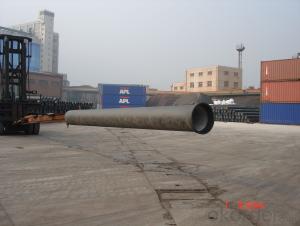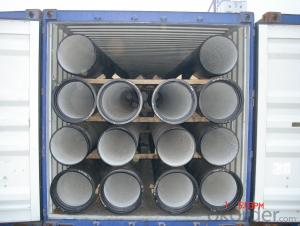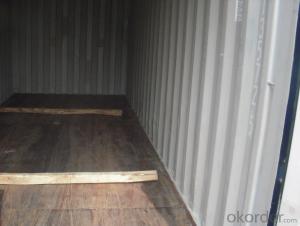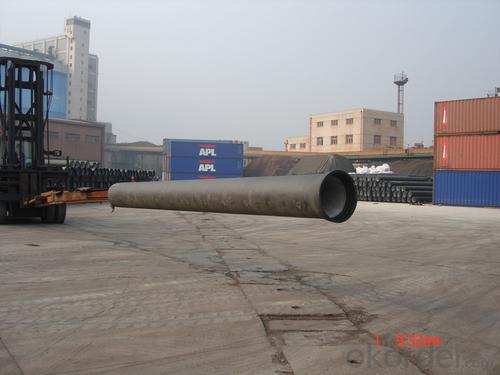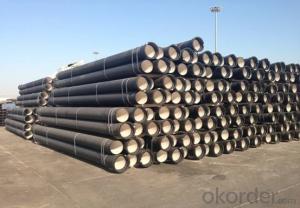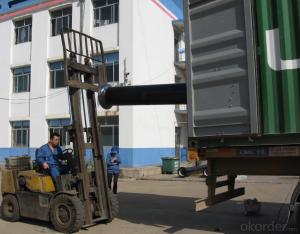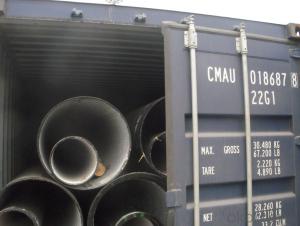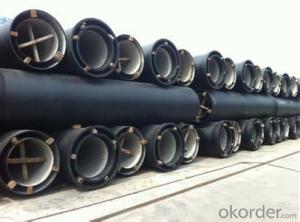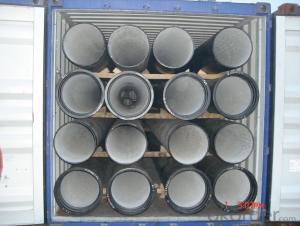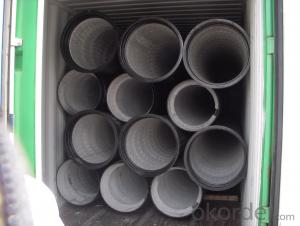DUCTILE IRON PIPES C Class DN1400
- Loading Port:
- China Main Port
- Payment Terms:
- TT OR LC
- Min Order Qty:
- -
- Supply Capability:
- -
OKorder Service Pledge
OKorder Financial Service
You Might Also Like
Ductile Iron Cast Pipe is without any defects compare with tradition casting tech, which has many advantages particularly as follow:
(1) High density. In the "vertical upward casting" process, the melt iron of centre liquid column in center crystallizer is continuously feeding for volume shrinkage caused by condensation tube at outer circumference , which lead to be free of shrinkage porosity.
(2) High purity. When melt iron pouring, the mixed impurities such as gas, dross, sand grain which are lighter than melt iron could be eliminated at furnace mouth, its impossible to enter into the crystallizer through the channel, so the melt iron into the crystallizer is very pure.
(3) Strength with toughness. The cooling speed provided by continuous crystallizer is 30 times than sand casting and 5 times than centrifugal casting, and doesn't produce white iron, the eutectic cell volume of continuous cast iron is one eighth to one tenth compare with traditional cast iron. The density of graphite nodule in ductile iron can reach 300-700 pcs/mm2. Therefore, all reason above improve the strength and toughness of continuous cast iron.
(4) Free machining. The high speed cooling make the hardening phase (such as boride, steadite) not appear like reticular, massive or thick, but diffuse like fish bone and pane in shape, moreover, there are tiny graphite flakes inlaid hardening phase. It's free machining in BrinellHardness the range of 250-300HB. However, the Brinell Hardness of 250 is top limit to common metal materials.
(5) Uniform composition of tube wall. The convection mixing of liquid column caused by marching type drawing in crystallizer make the composition of tube wall well-distributed, and concentration gradient very little.
(6) High productivity. To the wall thickness of tube under 10mm, the speed of continuous casting is 1 meter/min, to the wall thickness of tube under 20mm, the speed of continuous casting is 0.5 meter/min, which is high efficiency that centrifugal or other casting tech couldn't reach.
- Q: What are the differences between ductile cast iron pipes and centrifugal ductile iron pipes?
- Centrifugal casting is a casting method. Ball milling cast iron pipe is a kind of material.
- Q: What's the difference between grey cast iron pipe and ductile iron pipe?
- Spheroidal graphite cast iron and ordinary cast iron contain graphite monomer, that is to say, cast iron is a mixture of iron and graphite. The graphite in ordinary cast iron is flaky, and the strength of graphite is very low, so there are many flakes of voids in the cast iron, so the strength of ordinary cast iron is lower and more brittle. Graphite in graphite cast iron is spherical, equivalent to the existence of many spherical voids in cast iron. The effect of spherical voids on the strength of cast iron is much smaller than that of sheet voids, so the strength of nodular cast iron is much higher than that of ordinary cast iron.
- Q: How does ductile iron pipe perform in areas with high soil stability?
- Ductile iron pipe excels in areas characterized by high soil stability, as it possesses inherent strength and durability. This enables the pipe to withstand the soil's pressure without experiencing significant deformation or failure. The exceptional performance of ductile iron pipe is further bolstered by the minimal ground movements, settling, or shifting that is ensured by the stable soil conditions. In regions with high soil stability, the pipe is less susceptible to external forces or stresses that could potentially inflict damage. Ductile iron pipe exhibits remarkable resistance to corrosion, abrasion, and impact, rendering it highly suitable for such circumstances. The material's robustness allows it to endure the weight and pressure exerted by the soil, thereby guaranteeing the pipe's structural integrity over time. Furthermore, the flexibility and joint design of ductile iron pipe contribute to its performance in areas with high soil stability. The pipe's capacity to accommodate slight movements and minor ground shifts without compromising its integrity is advantageous in these stable soil conditions. The restrained joint system utilized in ductile iron pipe installations provides added support and stability, thereby minimizing the risk of pipe dislocation or failure. All in all, ductile iron pipe is a dependable and efficient choice for areas characterized by high soil stability. Its strength, durability, and resistance to external forces equip it to handle the demands of such environments. Additionally, the pipe's flexibility and joint design enable it to adapt to minor soil movements, thereby further enhancing its performance in these conditions.
- Q: Are ductile iron pipes suitable for pressure sewer systems?
- Ductile iron pipes, known for their high strength and durability, are a suitable option for pressure sewer systems. They have been widely used in various applications, including pressure sewer systems, due to their ability to withstand high pressure and provide a long-lasting solution for transporting sewage under pressure. One key advantage of ductile iron pipes is their excellent corrosion resistance, which is crucial in sewer systems where they are exposed to various chemicals and contaminants. These pipes are resistant to both internal and external corrosion, ensuring their durability and functionality over time. Moreover, ductile iron pipes have a smooth internal surface, minimizing friction and improving the flow capacity of the sewer system. This feature allows the pipes to handle the required flow rates and prevent blockages or backups. Additionally, ductile iron pipes are known for their ease of installation. They can be easily cut and joined using various methods, making them a convenient choice for pressure sewer systems. Overall, ductile iron pipes offer a reliable choice for pressure sewer systems, thanks to their high strength, corrosion resistance, smooth internal surface, and ease of installation.
- Q: How does ductile iron pipe handle soil movement?
- Ductile iron pipe is known for its excellent strength and durability, making it highly capable of handling soil movement. When the soil around the pipe shifts or settles, ductile iron pipes have the ability to flex and accommodate such movement without compromising their structural integrity. One of the key features that allows ductile iron pipes to handle soil movement is their inherent ability to withstand bending and stretching. They possess a high degree of flexibility, allowing them to adjust to ground shifts and settle without breaking or cracking. This flexibility is due to the unique material properties of ductile iron, which is a type of cast iron that has been treated with magnesium to enhance its strength and elasticity. Moreover, ductile iron pipes are designed with a thick-walled construction, which adds to their resistance against soil movement. This robust construction helps distribute the forces exerted by the shifting soil, minimizing the impact on the pipe and preventing any significant damage. In addition, ductile iron pipes are usually installed with appropriate bedding and backfill materials to provide additional support and stability. This includes using compacted soil or engineered granular materials around the pipe, which helps to evenly distribute the load and reduce the potential for soil movement. Overall, ductile iron pipe is an ideal choice for areas with high soil movement, such as regions with expansive or unstable soils. Its flexibility, strength, and proper installation techniques make it capable of handling the challenges posed by soil movement, ensuring long-lasting and reliable performance in various applications.
- Q: What is the expected roughness coefficient of ductile iron pipes?
- The roughness coefficient of ductile iron pipes can differ based on different factors like pipe diameter, age, and condition, resulting in variations. However, typically, the roughness coefficient for ductile iron pipes falls within the range of 0.01-0.015 mm. This value signifies the average roughness of the pipe's internal surface and plays a crucial role in hydraulic calculations for establishing the flow characteristics and pressure losses within the pipe network. It is worth mentioning that these values are approximate and subject to change depending on specific pipe conditions and applications.
- Q: Can ductile iron pipes be used for underground geothermal systems?
- Yes, ductile iron pipes can be used for underground geothermal systems. Ductile iron pipes are known for their strength, durability, and resistance to corrosion, making them suitable for various applications, including underground geothermal systems. These pipes can handle high temperatures and pressures, making them ideal for the transport of hot geothermal fluids. Additionally, ductile iron pipes have a long service life and can withstand the ground movements and stresses that occur in underground installations. Therefore, they can be a reliable choice for underground geothermal systems.
- Q: What are the different corrosion protection options for ductile iron pipe?
- To ensure the longevity and durability of ductile iron pipes, there are several options available for corrosion protection. These options are as follows: 1. Cement Mortar Lining: A layer of cement mortar is applied to the inner surface of the pipe, creating a barrier against corrosive elements in water or soil. This lining offers excellent corrosion resistance and can endure for many decades. 2. Polyethylene Encasement: The ductile iron pipe is wrapped with a layer of polyethylene material, which acts as a physical shield against external corrosive elements. This method is commonly employed in aggressive soil conditions and provides long-lasting protection. 3. Internal and External Coatings: Different types of coatings, such as epoxy, polyurethane, or fusion-bonded epoxy (FBE) coatings, can be applied to the inner and outer surfaces of the pipe to resist corrosion. These coatings form a barrier that prevents the pipe from corroding in the surrounding environment. 4. Cathodic Protection: An electrical current is utilized to safeguard the pipe from corrosion. Cathodic protection systems can be either galvanic (sacrificial anode) or impressed current systems. These systems control the flow of electrons, preventing the oxidation of the ductile iron pipe. 5. Zinc Coating: Also known as galvanizing, this method involves applying a layer of zinc to the surface of the ductile iron pipe. Zinc acts as a sacrificial anode, corroding instead of the iron pipe. Zinc coating is particularly effective in soil conditions with low resistivity, offering reliable corrosion protection. It is crucial to consider various factors such as the environment, water chemistry, soil conditions, and expected service life when choosing a corrosion protection option for ductile iron pipes. Consulting with corrosion protection specialists and engineers can assist in selecting the most suitable option for specific applications.
- Q: Are ductile iron pipes suitable for use in food processing plants?
- Yes, ductile iron pipes are suitable for use in food processing plants. Ductile iron pipes have a number of characteristics that make them highly suitable for this application. Firstly, ductile iron pipes are strong and durable, capable of withstanding high-pressure applications. This is important in food processing plants where the pipes are subjected to various pressures during the transportation of liquids and slurries. Additionally, ductile iron pipes have excellent corrosion resistance. This is crucial in food processing plants where the pipes come into contact with different types of food, beverages, and cleaning agents, which can be corrosive over time. The corrosion resistance of ductile iron pipes ensures the integrity of the pipes and prevents contamination of the food products. Furthermore, ductile iron pipes are highly resistant to temperature fluctuations, making them suitable for the extreme temperature conditions often found in food processing plants. They can withstand both hot and cold fluids without any adverse effects on their structural integrity. Moreover, ductile iron pipes have a smooth inner surface, which helps to maintain the quality and purity of food products. The smooth interior minimizes the formation of deposits, such as scaling or biofilm, and reduces the risk of bacterial growth. This is essential in food processing plants where maintaining a hygienic environment is of utmost importance. Lastly, ductile iron pipes are easy to install and maintain. They have a long service life and require minimal maintenance, reducing downtime and associated costs in food processing plants. Considering these factors, ductile iron pipes are a reliable and suitable choice for use in food processing plants, ensuring the safe and efficient transportation of fluids while meeting the stringent hygiene and quality requirements of the industry.
- Q: Can ductile iron pipes be used for marine applications?
- Yes, ductile iron pipes can be used for marine applications. Ductile iron is known for its high strength and durability, making it suitable for various environments, including marine environments. It has excellent corrosion resistance properties, which enable it to withstand the harsh conditions of saltwater exposure. Additionally, ductile iron pipes have been used in marine applications such as wastewater treatment plants, desalination plants, and offshore platforms. However, it is important to consider proper coating and maintenance to enhance the longevity of ductile iron pipes in marine applications.
Send your message to us
DUCTILE IRON PIPES C Class DN1400
- Loading Port:
- China Main Port
- Payment Terms:
- TT OR LC
- Min Order Qty:
- -
- Supply Capability:
- -
OKorder Service Pledge
OKorder Financial Service
Similar products
Hot products
Hot Searches
Related keywords
